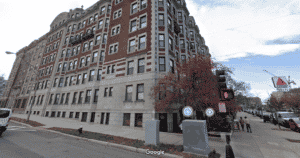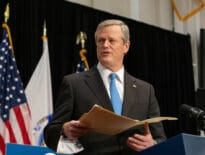Longtime residents of a Fenway roominghouse are seeking to acquire the property to maintain its historical use as affordable housing for women and prevent a potential sale to a for-profit developer.
Seven residents of Our Lady’s Guild House submitted a bid on the 20 Charlesgate West property this month. Greater Boston Legal Services is representing the group and will ask the attorney general’s office to block any sale that would convert the building into market-rate apartments, attorney Margaret Turner said.
“The charitable purpose of OLGH Inc. is to provide permanent [single-room occupancy] housing for low and moderate-income women,” Turner said. “The proposed sale to the highest bidder will undermine this purpose.”
The resident group is partnering with an undisclosed land trust on its bid, which would assume the existing liabilities on the property. The Our Lady’s Guild House Restoration Coalition would create a charity to own and operate the property as 137 housing units for low- and moderate-income women, resident Lydia Eccles said.
The owners, New Britain, Connecticut-based Daughters of Mary of the Immaculate Conception, hired Colliers International to market the property in early fall. An offering sheet issued by the brokerage states the property “offers a significant development opportunity” for up to 83 studio and 26 one-bedroom apartments, and that the buyer will be required to agree to deed restrictions to ensure long-term affordability. In announcing the offering, OLGH ownership said it would only accept bids from buyers who would commit to using “in total or in significant part” of the property for affordable housing.
The property was established as a roominghouse for low- and moderate-income women in 1947 by the Archdiocese of Boston.
In the past decade, the owners began raising rents and marketing short-term rentals to Fenway-area college students, prompting longtime residents to file an age discrimination complaint with the attorney general’s office. The complaint yielded a cease-and-desist order on evictions in 2019.
Under Massachusetts laws governing nonprofits and public charities, the owners are required to file a notice of intent to sell with the attorney general’s office at least 30 days in advance, Turner said. Greater Boston Legal Services maintains that a sale to a for-profit developer would violate the state charities law, because the property is the religious order’s sole asset and the proceeds would go to an out-of-state entity.
“There is a dire need for safe and affordable housing for low-income women in Boston. A huge number of low-income women in Boston are forced to live in illegal rooming houses that are not safe, often with abusive landlords,” the legal aid organization said in a statement. “Our Lady’s Guild House currently serves a vitally important purpose to provide a haven for low-income women without any other decent, safe place to live in Boston.”
A spokesperson for the property owners did not respond to a request for comment.









